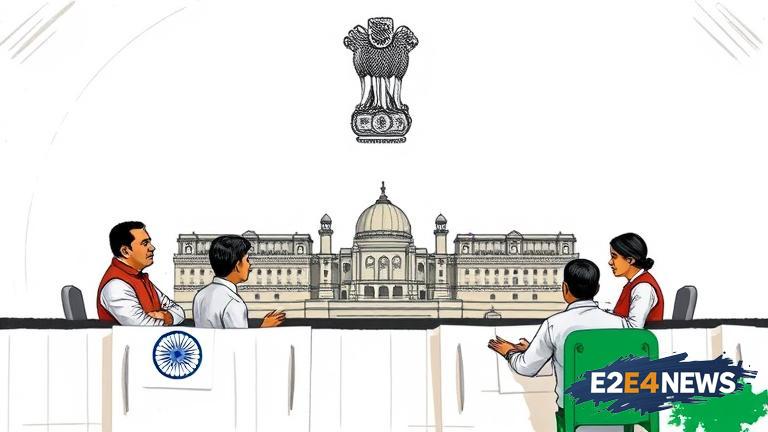The concept of ‘One Nation, One Election’ has been a topic of discussion in India for quite some time now. Recently, a parliamentary committee met at the Parliament House to deliberate on the pros and cons of holding simultaneous elections for the Lok Sabha and state assemblies. The committee, headed by a senior politician, comprised members from various political parties. The meeting was attended by experts, bureaucrats, and other stakeholders who presented their views on the matter. The concept of ‘One Nation, One Election’ aims to reduce the frequency of elections in the country, which can help minimize the costs and distractions associated with frequent polls. It is also expected to promote stability and continuity in governance. However, some experts argue that simultaneous elections may not be feasible in a country as diverse and large as India. They cite the example of the United States, where presidential and congressional elections are held separately. The committee members discussed the potential benefits and drawbacks of the concept, including its impact on the electoral process, political parties, and the overall governance of the country. Some members suggested that simultaneous elections could lead to a more stable and effective government, while others expressed concerns about the potential for voter fatigue and decreased turnout. The committee also examined the constitutional and legal implications of implementing the ‘One Nation, One Election’ concept. They discussed the need for amendments to the Constitution and the Representation of the People Act, which would require a broad consensus among political parties. The meeting was a significant step towards exploring the feasibility of the concept, and the committee is expected to submit its report to the government soon. The report will provide valuable insights and recommendations on the way forward. The ‘One Nation, One Election’ concept has been endorsed by the ruling party, which believes it can help reduce electoral expenses and promote a more stable political environment. However, the opposition parties have expressed reservations, citing concerns about the potential impact on regional parties and the federal structure of the country. The committee’s report is eagerly awaited, as it will provide a comprehensive analysis of the pros and cons of the concept. The report will also examine the international best practices and the experiences of other countries that have implemented similar systems. The ‘One Nation, One Election’ concept has sparked a lively debate in India, with proponents arguing that it can help streamline the electoral process and promote better governance. On the other hand, critics argue that it may lead to a more centralized system of governance, which could undermine the federal structure of the country. The committee’s deliberations are a significant step towards resolving the debate and providing a clear direction on the way forward. The meeting was attended by senior bureaucrats, who presented their views on the administrative and logistical implications of implementing the concept. They discussed the need for a robust electoral infrastructure, including electronic voting machines and voter verification systems. The committee members also examined the potential impact of simultaneous elections on the electoral rolls and the voter registration process. The ‘One Nation, One Election’ concept is a complex issue that requires careful consideration of various factors, including the constitutional, legal, and administrative implications. The committee’s report will provide a comprehensive analysis of these factors and recommend the best course of action. The report is expected to be submitted to the government soon, and it will be closely watched by political parties, experts, and other stakeholders. The ‘One Nation, One Election’ concept has the potential to transform the electoral landscape of India, and the committee’s report will play a crucial role in shaping the future of the country’s democratic system.





